#jaroslaw kaminski
Explore tagged Tumblr posts
Photo

Agata Trzebuchowska in Ida (Pawel Pawlikowski, 2013)
Cast: Agata Kulezsa, Agata Trzebuchowska, Dawid Ogrodnik, Adam Szyszkowski, Jerzy Trela, Joanna Kulig. Screenplay: Pawel Pawlikowski, Rebecca Lenkiewicz, Cinematography: Ryszard Lenczewski, Lukasz Zal. Production design: Marcel Slawinski, Katarzyna Sobanska. Film editing: Jaroslaw Kaminski. Music: Kristian Eidnes Andersen.
A successful film needs the correct balance of story and style, and when the story is as straightforward as Ida's, there's a great risk of overwhelming it with stylistic tricks. A novice called Anna (Agata Trzebuchowska) is about to take her vows to become a nun when she learns that she has an aunt, Wanda Gruz (Agata Kulesza), who wants to meet her. It is the 1960s, and Wanda is a judge in the courts of the communist government with a reputation for having for having presided brutally over the show trials of the 1950s that solidified communist power. She tells Anna, who was raised in an orphanage, that she was born to Jewish parents, one of whom was Wanda's sister, and that her birth name was Ida Lebenstein. Anna goes with Wanda in search of the graves of her parents and the son whom Wanda left with them when she joined the resistance during the war. Along the way, the tough, hard-drinking, sexually liberated Wanda, determined to provoke Anna out of her ascetic, devout ways, picks up a handsome young hitchhiker named Lis (Dawid Ogrodnik), a jazz saxophonist on his way to a gig. The story that director Pawel Pawlikowski and co-screenwriter Rebecca Lenkiewicz develop from this situation is told in an austerely beautiful manner. Two cinematographers are credited: Lukasz Zal took over as director of photography after Ryszard Lenczewski became ill during filming; both were deservedly nominated for cinematography Oscars. Pawlikowski chose to film in black-and-white to evoke the Polish films of the 1960s, the era of the young Roman Polanski, Jerzy Skolimowski, and Andrzej Wajda, although it's more accurate to refer to the cinematography as monochrome because the use of the many shades of gray and the emphasis on the textures of walls and skies and landscapes is extraordinary. The images are also strikingly framed: Characters rarely appear in the direct center of the screen, but are shifted toward the bottom or the corner of images. (Remarkably, the film also sometimes moves the subtitles from the bottom to the top of the frame to accommodate this placement.) Such manipulations could be seen as mannered, but I think it works to suggest that the lives of the characters themselves have been placed somewhere slightly off-center.
1 note
·
View note
Video
youtube
Film Persona on the Power of the Leitmotif in Cold War
#video essay#film persona#cinema#pawel pawlikowski#bw#joanna kulig#cold war#polish cinema#janusz glowacki#tomasz kot#borys szyc#lukasz zal#jaroslaw kaminski#katarzyna sobanska#marcin masecki
22 notes
·
View notes
Photo
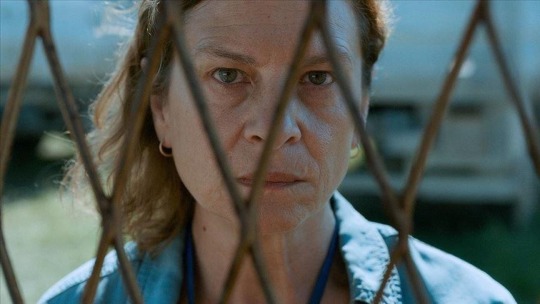
Quo vadis, Aida?, Jasmila Zbanic (2020)
#Jasmila Zbanic#Jasna Djuricic#Izudin Bajrovic#Boris Ler#Dino Bajrovic#Johan Heldenbergh#Raymond Thiry#Boris Isakovic#Emir Hadzihafizbegovic#Reinout Bussemaker#Teun Luijkx#Juda Goslinga#Jelena Kordic#Alban Ukaj#Christine A. Maier#Antoni Lazarkiewicz#Jaroslaw Kaminski#2020#woman director
1 note
·
View note
Photo

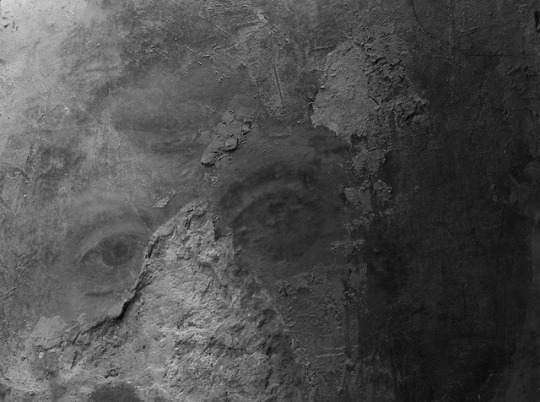
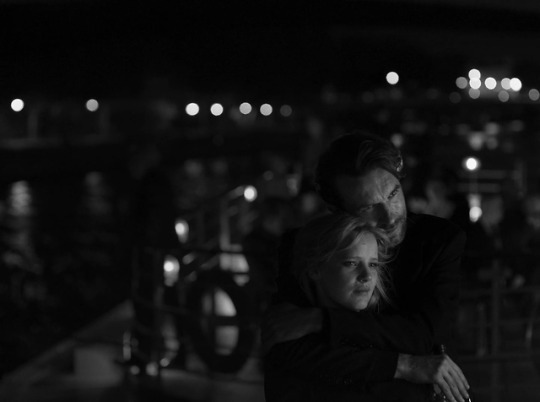

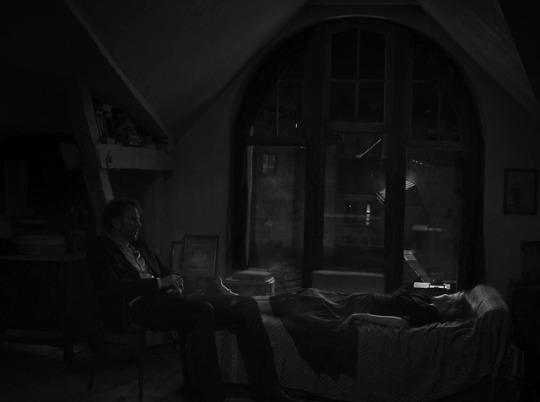
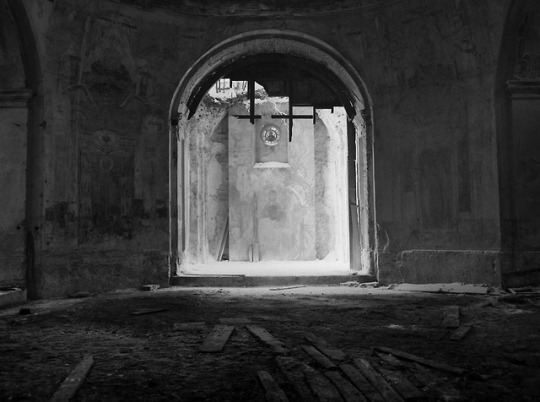
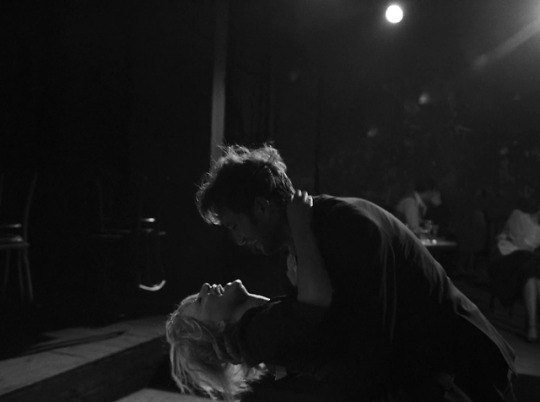
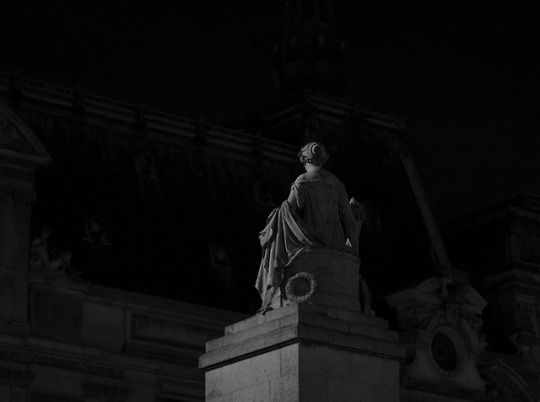
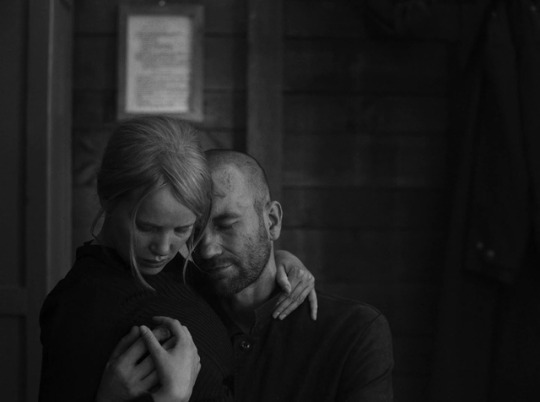
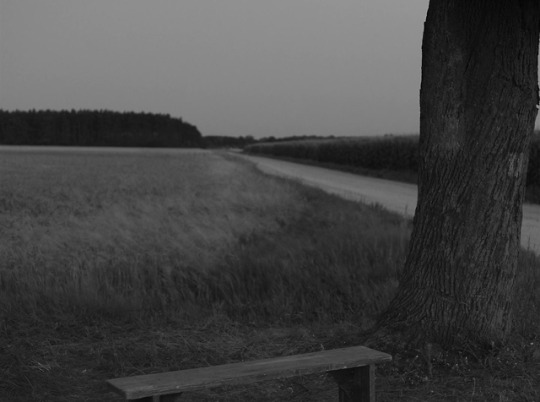
Zimna wojna ~ Cold War (2018 - Pawel Pawlikowski)
#zimna wojna#cold war#soğuk savaş#pawel pawlikowski#joanna kulig#tomasz kot#agata kulesza#cédric kahn#lukasz zal#jaroslaw kaminski#polish cinema#romance#best films of 2018#2018#2018 films#films#cinema#film scenes#film stills#best of 2018
437 notes
·
View notes
Photo










Cold War (Pawel Pawlikowski, 2018).
#cold war#cold war (2018)#pawel pawlikowski#joanna kulig#tomasz kot#borys szyc#lukasz zal#jaroslaw kaminski#marcel slawinski#katarzyna sobanska-strzalkowska#ola staszko
102 notes
·
View notes
Photo










Cold War (2018)
“Let’s go to the other side. The view will be better there.”
Country: Poland / UK / France
Directed by: Pawel Pawlikowski
Written by: Pawlikowski, Janusz Glowacki & Piotr Borkowski Story by: Pawlikowski
Cinematography by: Lukasz Zal
Edited by: Jaroslaw Kaminski
Produced by: Tanya Seghatchian & Ewa Puszczynska
Music by: Marcin Masecki
Production Design by: Marcel Slawinski, Katarzyna Sobanska-Strzalkowska & Benoît Barouh
#Cold War#Movie#Poland#United Kingdom#France#Pawel Pawlikowski#Janusz Glowacki#Piotr Borkowski#Lukasz Zal#Jaroslaw Kaminski#Tanya Seghatchian#Ewa Puszczynska#Marcin Masecki#Marcel Slawinski#Katarzyna Sobanska-Strzalkowska#Benoît Barouh#Amazon Studios#2010s#Romance#Drama#Music#History#Historical Drama#Period Drama
2 notes
·
View notes
Text
Best Film Editing 2021
Winner:
Zola - Joi McMillon
Nominees:
The Lost Daughter - Affonso Gonçalves New Order - Óscar Figueroa & Michel Franco The Power of the Dog - Peter Sciberras Quo Vadis, Aida? - Jaroslaw Kaminski The Worst Person in the World - Olivier Bugge Coutté

Best Original Score 2021
Winner:
The Green Knight - Daniel Hart
Nominees:
Broadcast Signal Intrusion - Ben Lovett Little Fish - Keegan DeWitt Spencer - Jonny Greenwood Swan Song - Jay Wadley The Power of the Dog - Jonny Greenwood

Best Sound Editing 2021
Winner:
Dune - Mark Mangini, Theo Green
Nominees:
Censor - Tim Harrison The Green Knight - Johnny Marshall & Christopher Barnett The Humans - Skip Lievsay In the Earth - Martin Pavey Malignant - Peter Staubli

Best Sound Mixing 2021
Winner:
Memoria - Alkritchalerm Kalaynmitr & Javier Umpierrez
Nominees:
The Disciple - Naren Chandavarkar, Anita Kushawa, Lars Ginzel The Humans - Skip Lievsay, Paul Urmson, Tammy M. Douglas, Chris Chae New Order - Alejandro de Icaza, Jaime Baksht, Michelle Couttolenc The Power of the Dog - Graeme Stewart & Steve Burgess This is Not a Burial, It's a Resurrection - Daniel Caleb, James Matthes

Best Visual Effects
Winner:
The Matrix Resurrections
Nominees:
Dune The Green Knight Malignant Swan Song The Tragedy of Macbeth
#awards 2021#original score continues to be the movies I made up category#this is all you dunc-heads are getting
8 notes
·
View notes
Text
Žbanić: Emirova gluma aktivirala je stare traume, dvije djevojke su se onesvjestile
Žbanić: Emirova gluma aktivirala je stare traume, dvije djevojke su se onesvjestile
„Quo Vadis, Aida?” je film o genocidu u Srebrenici i prvi igrani film na ovu temu. Jasmila Žbanić je napisala scenario i režirala film a u glavnim ulogama su Jasna Đuričić, Izudin Bajrović, Boris Ler, Dino Bajrović, Emir Hadžihafizbegović i Boris Isaković. Za kamerom je bila Christine A. Maier, a montirao ga je Jaroslaw Kaminski. Film traje 103 minute.
– Ovo je najveći projekat koji smo mi, iz…
View On WordPress
0 notes
Text
Polish-EU tensions flare again as new law requires judges to quit
WARSAW (Reuters) – A long-running dispute between Poland and the European Union over democratic values escalated on Wednesday when new legislation came into force that requires about a third of judges at the Supreme Court to retire.
Supreme Court President Malgorzata Gersdorf walks to the Supreme Court building, next to supporters, in Warsaw, Poland July 4, 2018. Agencja Gazeta/Maciej Jazwiecki via REUTERS
The EU accuses Poland’s ruling right-wing Law and Justice party (PiS) of trying to control the judiciary and subvert democratic standards. Warsaw says the changes are needed to free the judiciary of communist-era thinking and practices.
The president of the Supreme Court, Malgorzata Gersdorf, defied the new law on Wednesday morning by going to her office as usual, to applause from hundreds of supporters who chanted “constitution” and sang the Polish national anthem.
“My presence here is not about politics, I am here to protect the rule of law,” she told reporters.
Gersdorf is 65, the age at which judges are now required to retire, but a constitutional law expert said she met the conditions to remain in place until her six-year term has expired. Gersdorf became Supreme Court president in 2014.
“The law cannot work retroactively. So this legislation… is clearly unconstitutional… and could lead to paralysis at the Supreme Court,” said the expert, Marek Chmaj.
Addressing the European Parliament on Wednesday in Strasbourg, Polish Prime Minister Mateusz Morawiecki defended his government’s overhaul of the judiciary.
“Each EU state has the right to shape their legal system according to their own traditions,” he said, adding that the EU should focus on external challenges and not wage a “campaign” against the democratically elected government of a member state.
Supreme Court President Malgorzata Gersdorf talks to the media at the Supreme Court building, in Warsaw, Poland July 4, 2018. Agencja Gazeta/Slawomir Kaminski via REUTERS
PROTESTS
EU lawmakers gave Morawiecki a rough reception. Maltese lawmaker Roberta Metsola said the judicial reforms were about “consolidating (government) control by weakening the institutions designed to keep you in check”.
After staging protests on Tuesday outside the Supreme Court, Polish pro-democracy activists have vowed to hold more rallies around the country on Wednesday.
Lech Walesa, a Nobel Peace Prize Laureate and former president credited with bringing down Polish communism in 1989, was expected to address a rally in Warsaw on Wednesday evening.
“We are moving toward a dictatorship,” said Joanna Tworog, a 65-year-old webmaster in the crowd supporting Gersdorf.
“What if I have a court case against someone from PiS and they can influence judges? These changes affect me personally.”
Supreme Court President Malgorzata Gersdorf addresses the supporters and the media before entering the Supreme Court building in Warsaw, Poland, July 4, 2018. REUTERS/Marcin Goclowski
Through legislation and personnel changes, PiS has already taken de facto control of much of the judicial system since taking power in 2015, including the constitutional court and prosecutors, who now report directly to the justice minister.
Critics at home and abroad say the ruling party’s policies, which also include tighter control of public media, amount to a shift toward authoritarian rule.
The conflict has isolated Poland in Europe, where most governments are critical, while also exposing the EU’s inability to rein in governments it believes contradict core EU values.
The European Commission opened a fresh legal case against Poland over the Supreme Court changes on Monday, saying they undermine judicial independence in the largest ex-communist EU member state.
Warsaw faces the theoretical threat of losing its voting rights in the EU under a procedure launched late last year in response to the reforms. But Hungary, also facing criticism over democratic standards, has pledged to block such a move.
The PiS government says EU treaties do not give Brussels institutions the power to influence national matters such as the judiciary.
“The court system … is an entirely internal matter,” PiS leader Jaroslaw Kaczynski was quoted as saying by Gazeta Polska newsweekly in an article published on Wednesday.
The party’s standing in polls has held steady at around 40 percent throughout the dispute, well above any other rival.
Writing by Justyna Pawlak and Agnieszka Barteczko; Editing by Gareth Jones
The post Polish-EU tensions flare again as new law requires judges to quit appeared first on World The News.
from World The News https://ift.tt/2KMP98Z via Breaking News
0 notes
Text
Polish-EU tensions flare again as new law requires judges to quit
WARSAW (Reuters) – A long-running dispute between Poland and the European Union over democratic values escalated on Wednesday when new legislation came into force that requires about a third of judges at the Supreme Court to retire.
Supreme Court President Malgorzata Gersdorf walks to the Supreme Court building, next to supporters, in Warsaw, Poland July 4, 2018. Agencja Gazeta/Maciej Jazwiecki via REUTERS
The EU accuses Poland’s ruling right-wing Law and Justice party (PiS) of trying to control the judiciary and subvert democratic standards. Warsaw says the changes are needed to free the judiciary of communist-era thinking and practices.
The president of the Supreme Court, Malgorzata Gersdorf, defied the new law on Wednesday morning by going to her office as usual, to applause from hundreds of supporters who chanted “constitution” and sang the Polish national anthem.
“My presence here is not about politics, I am here to protect the rule of law,” she told reporters.
Gersdorf is 65, the age at which judges are now required to retire, but a constitutional law expert said she met the conditions to remain in place until her six-year term has expired. Gersdorf became Supreme Court president in 2014.
“The law cannot work retroactively. So this legislation… is clearly unconstitutional… and could lead to paralysis at the Supreme Court,” said the expert, Marek Chmaj.
Addressing the European Parliament on Wednesday in Strasbourg, Polish Prime Minister Mateusz Morawiecki defended his government’s overhaul of the judiciary.
“Each EU state has the right to shape their legal system according to their own traditions,” he said, adding that the EU should focus on external challenges and not wage a “campaign” against the democratically elected government of a member state.
Supreme Court President Malgorzata Gersdorf talks to the media at the Supreme Court building, in Warsaw, Poland July 4, 2018. Agencja Gazeta/Slawomir Kaminski via REUTERS
PROTESTS
EU lawmakers gave Morawiecki a rough reception. Maltese lawmaker Roberta Metsola said the judicial reforms were about “consolidating (government) control by weakening the institutions designed to keep you in check”.
After staging protests on Tuesday outside the Supreme Court, Polish pro-democracy activists have vowed to hold more rallies around the country on Wednesday.
Lech Walesa, a Nobel Peace Prize Laureate and former president credited with bringing down Polish communism in 1989, was expected to address a rally in Warsaw on Wednesday evening.
“We are moving toward a dictatorship,” said Joanna Tworog, a 65-year-old webmaster in the crowd supporting Gersdorf.
“What if I have a court case against someone from PiS and they can influence judges? These changes affect me personally.”
Supreme Court President Malgorzata Gersdorf addresses the supporters and the media before entering the Supreme Court building in Warsaw, Poland, July 4, 2018. REUTERS/Marcin Goclowski
Through legislation and personnel changes, PiS has already taken de facto control of much of the judicial system since taking power in 2015, including the constitutional court and prosecutors, who now report directly to the justice minister.
Critics at home and abroad say the ruling party’s policies, which also include tighter control of public media, amount to a shift toward authoritarian rule.
The conflict has isolated Poland in Europe, where most governments are critical, while also exposing the EU’s inability to rein in governments it believes contradict core EU values.
The European Commission opened a fresh legal case against Poland over the Supreme Court changes on Monday, saying they undermine judicial independence in the largest ex-communist EU member state.
Warsaw faces the theoretical threat of losing its voting rights in the EU under a procedure launched late last year in response to the reforms. But Hungary, also facing criticism over democratic standards, has pledged to block such a move.
The PiS government says EU treaties do not give Brussels institutions the power to influence national matters such as the judiciary.
“The court system … is an entirely internal matter,” PiS leader Jaroslaw Kaczynski was quoted as saying by Gazeta Polska newsweekly in an article published on Wednesday.
The party’s standing in polls has held steady at around 40 percent throughout the dispute, well above any other rival.
Writing by Justyna Pawlak and Agnieszka Barteczko; Editing by Gareth Jones
The post Polish-EU tensions flare again as new law requires judges to quit appeared first on World The News.
from World The News https://ift.tt/2KMP98Z via Today News
0 notes
Video
youtube
Zula (played by Joanna Kulig) sings Dwa Serduszka (AKA Two Hearts, Four Eyes) in a clip from Zimna wojna (Cold War, dir. Pawel Pawlikowski, 2018)
#polish cinema#pawel pawlikowski#joanna kulig#tomasz kot#marcin masecki#lukasz zal#janusz glowacki#piotr borkowski#ivana patricia dilas ceranic#benoît barouh#jaroslaw kaminski#katarzyna sobanska strzalkowska#marcel slawinski#ola staszko#anna woloszczuk#waldemar pokromski#magdalena malisz#judyta pieprzyk#tadeusz sygietynski#mira ziminska#ewa puszczynska#tanya seghatchian#zimna wojna#cinema
38 notes
·
View notes
Photo

Fugue (Fuga), Agnieszka Smoczynska (2018)
#Agnieszka Smoczynska#Gabriela Muskala#Lukasz Simlat#Malgorzata Buczkowska#Piotr Skiba#Halina Rasiakówna#Zbigniew Walerys#Dariusz Chojnacki#Jakub Kijowski#Filip Mísek#Jaroslaw Kaminski#2018#woman director
2 notes
·
View notes
Photo










November (2017 - Rainer Sarnet)
#november#rainer sarnet#andrus kivirähk#rea lest#jörgen liik#arvo kukumägi#katariina unt#taavi eelmaa#jette loona hermanis#rehepapp#estonian cinema#movies#films#cinema#film stills#jacaszek#mart taniel#jaroslaw kaminski#surrealism#best films of 2017#best of 2017#2017#2017 movies#2017 films#novemberfilm#rehepappfilm
203 notes
·
View notes
Text
Polish-EU tensions flare again as new law requires judges to quit
WARSAW (Reuters) – A long-running dispute between Poland and the European Union over democratic values escalated on Wednesday when new legislation came into force that requires about a third of judges at the Supreme Court to retire.
Supreme Court President Malgorzata Gersdorf walks to the Supreme Court building, next to supporters, in Warsaw, Poland July 4, 2018. Agencja Gazeta/Maciej Jazwiecki via REUTERS
The EU accuses Poland’s ruling right-wing Law and Justice party (PiS) of trying to control the judiciary and subvert democratic standards. Warsaw says the changes are needed to free the judiciary of communist-era thinking and practices.
The president of the Supreme Court, Malgorzata Gersdorf, defied the new law on Wednesday morning by going to her office as usual, to applause from hundreds of supporters who chanted “constitution” and sang the Polish national anthem.
“My presence here is not about politics, I am here to protect the rule of law,” she told reporters.
Gersdorf is 65, the age at which judges are now required to retire, but a constitutional law expert said she met the conditions to remain in place until her six-year term has expired. Gersdorf became Supreme Court president in 2014.
“The law cannot work retroactively. So this legislation… is clearly unconstitutional… and could lead to paralysis at the Supreme Court,” said the expert, Marek Chmaj.
Addressing the European Parliament on Wednesday in Strasbourg, Polish Prime Minister Mateusz Morawiecki defended his government’s overhaul of the judiciary.
“Each EU state has the right to shape their legal system according to their own traditions,” he said, adding that the EU should focus on external challenges and not wage a “campaign” against the democratically elected government of a member state.
Supreme Court President Malgorzata Gersdorf talks to the media at the Supreme Court building, in Warsaw, Poland July 4, 2018. Agencja Gazeta/Slawomir Kaminski via REUTERS
PROTESTS
EU lawmakers gave Morawiecki a rough reception. Maltese lawmaker Roberta Metsola said the judicial reforms were about “consolidating (government) control by weakening the institutions designed to keep you in check”.
After staging protests on Tuesday outside the Supreme Court, Polish pro-democracy activists have vowed to hold more rallies around the country on Wednesday.
Lech Walesa, a Nobel Peace Prize Laureate and former president credited with bringing down Polish communism in 1989, was expected to address a rally in Warsaw on Wednesday evening.
“We are moving toward a dictatorship,” said Joanna Tworog, a 65-year-old webmaster in the crowd supporting Gersdorf.
“What if I have a court case against someone from PiS and they can influence judges? These changes affect me personally.”
Supreme Court President Malgorzata Gersdorf addresses the supporters and the media before entering the Supreme Court building in Warsaw, Poland, July 4, 2018. REUTERS/Marcin Goclowski
Through legislation and personnel changes, PiS has already taken de facto control of much of the judicial system since taking power in 2015, including the constitutional court and prosecutors, who now report directly to the justice minister.
Critics at home and abroad say the ruling party’s policies, which also include tighter control of public media, amount to a shift toward authoritarian rule.
The conflict has isolated Poland in Europe, where most governments are critical, while also exposing the EU’s inability to rein in governments it believes contradict core EU values.
The European Commission opened a fresh legal case against Poland over the Supreme Court changes on Monday, saying they undermine judicial independence in the largest ex-communist EU member state.
Warsaw faces the theoretical threat of losing its voting rights in the EU under a procedure launched late last year in response to the reforms. But Hungary, also facing criticism over democratic standards, has pledged to block such a move.
The PiS government says EU treaties do not give Brussels institutions the power to influence national matters such as the judiciary.
“The court system … is an entirely internal matter,” PiS leader Jaroslaw Kaczynski was quoted as saying by Gazeta Polska newsweekly in an article published on Wednesday.
The party’s standing in polls has held steady at around 40 percent throughout the dispute, well above any other rival.
Writing by Justyna Pawlak and Agnieszka Barteczko; Editing by Gareth Jones
The post Polish-EU tensions flare again as new law requires judges to quit appeared first on World The News.
from World The News https://ift.tt/2KMP98Z via News of World
0 notes
Photo










Ida (2013)
Country: Poland / Denmark / France / United Kingdom
Directed by: Pawel Pawlikowski
Written by: Pawlikowski & Rebecca Lenkiewicz
Cinematography by: Ryszard Lenczewski & Lukasz Zal
Edited by: Jaroslaw Kaminski
Produced by: Piotr Dzieciol, Ewa Puszczynska & Eric Abraham
Music by: Kristian Eidnes Andersen
Production Design by: Marcel Slawinski & Katarzyna Sobanska-Strzalkowska
Art Direction by: Jagna Dobesz
#Ida#Movie#Poland#Denmark#France#United Kingdom#Pawel Pawlikowski#Rebecca Lenkiewicz#Ryszard Lenczewski#Lukasz Zal#Jaroslaw Kaminski#Piotr Dzieciol#Ewa Puszczynska#Eric Abraham#Kristian Eidnes Andersen#Marcel Slawinski#Katarzyna Sobanska-Strzalkowska#Jagna Dobesz#Music Box Films#2010s#Drama
2 notes
·
View notes
Text
Polish-EU tensions flare again as new law requires judges to quit
WARSAW (Reuters) – A long-running dispute between Poland and the European Union over democratic values escalated on Wednesday when new legislation came into force that requires about a third of judges at the Supreme Court to retire.
Supreme Court President Malgorzata Gersdorf walks to the Supreme Court building, next to supporters, in Warsaw, Poland July 4, 2018. Agencja Gazeta/Maciej Jazwiecki via REUTERS
The EU accuses Poland’s ruling right-wing Law and Justice party (PiS) of trying to control the judiciary and subvert democratic standards. Warsaw says the changes are needed to free the judiciary of communist-era thinking and practices.
The president of the Supreme Court, Malgorzata Gersdorf, defied the new law on Wednesday morning by going to her office as usual, to applause from hundreds of supporters who chanted “constitution” and sang the Polish national anthem.
“My presence here is not about politics, I am here to protect the rule of law,” she told reporters.
Gersdorf is 65, the age at which judges are now required to retire, but a constitutional law expert said she met the conditions to remain in place until her six-year term has expired. Gersdorf became Supreme Court president in 2014.
“The law cannot work retroactively. So this legislation… is clearly unconstitutional… and could lead to paralysis at the Supreme Court,” said the expert, Marek Chmaj.
Addressing the European Parliament on Wednesday in Strasbourg, Polish Prime Minister Mateusz Morawiecki defended his government’s overhaul of the judiciary.
“Each EU state has the right to shape their legal system according to their own traditions,” he said, adding that the EU should focus on external challenges and not wage a “campaign” against the democratically elected government of a member state.
Supreme Court President Malgorzata Gersdorf talks to the media at the Supreme Court building, in Warsaw, Poland July 4, 2018. Agencja Gazeta/Slawomir Kaminski via REUTERS
PROTESTS
EU lawmakers gave Morawiecki a rough reception. Maltese lawmaker Roberta Metsola said the judicial reforms were about “consolidating (government) control by weakening the institutions designed to keep you in check”.
After staging protests on Tuesday outside the Supreme Court, Polish pro-democracy activists have vowed to hold more rallies around the country on Wednesday.
Lech Walesa, a Nobel Peace Prize Laureate and former president credited with bringing down Polish communism in 1989, was expected to address a rally in Warsaw on Wednesday evening.
“We are moving toward a dictatorship,” said Joanna Tworog, a 65-year-old webmaster in the crowd supporting Gersdorf.
“What if I have a court case against someone from PiS and they can influence judges? These changes affect me personally.”
Supreme Court President Malgorzata Gersdorf addresses the supporters and the media before entering the Supreme Court building in Warsaw, Poland, July 4, 2018. REUTERS/Marcin Goclowski
Through legislation and personnel changes, PiS has already taken de facto control of much of the judicial system since taking power in 2015, including the constitutional court and prosecutors, who now report directly to the justice minister.
Critics at home and abroad say the ruling party’s policies, which also include tighter control of public media, amount to a shift toward authoritarian rule.
The conflict has isolated Poland in Europe, where most governments are critical, while also exposing the EU’s inability to rein in governments it believes contradict core EU values.
The European Commission opened a fresh legal case against Poland over the Supreme Court changes on Monday, saying they undermine judicial independence in the largest ex-communist EU member state.
Warsaw faces the theoretical threat of losing its voting rights in the EU under a procedure launched late last year in response to the reforms. But Hungary, also facing criticism over democratic standards, has pledged to block such a move.
The PiS government says EU treaties do not give Brussels institutions the power to influence national matters such as the judiciary.
“The court system … is an entirely internal matter,” PiS leader Jaroslaw Kaczynski was quoted as saying by Gazeta Polska newsweekly in an article published on Wednesday.
The party’s standing in polls has held steady at around 40 percent throughout the dispute, well above any other rival.
Writing by Justyna Pawlak and Agnieszka Barteczko; Editing by Gareth Jones
The post Polish-EU tensions flare again as new law requires judges to quit appeared first on World The News.
from World The News https://ift.tt/2KMP98Z via Everyday News
0 notes